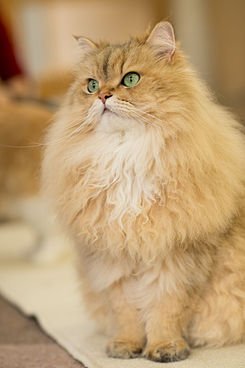
The Persian cat is characterized by its medium to large size. It has a round, massive head and a broad skull. The forehead is rounded and the cheek bones are strong and prominent. It has a short muzzle and a strong and full chin. The eyes are large, round, wide open and the farther apart the better, of a very intense and bright color. The position of the nose should be asymmetrical but it is very important that it is at the level of the eyes and depth "nose (flat)" for a show cat. The ears of the Persian cat are small and rounded, they should be in an asymmetrical "V" position on the head. The tips of the ears are covered with hair that grows from the inside out, so they are unnoticed and very aesthetic, confused with the long hair on the back, legs and head.
The body of the Persian cat is muscular and rounded and has a robust bone structure. The best body type in this breed is compact and is known as the "Corby body". It stands out above the paws which are small and thick.
The hair is abundant, thick, long and silky to the touch. In addition, it is common for them to shed quite a lot of hair due to its abundance. The tail is hairy and rounded at the end. Thus, we can say that Persian cats do not stand out for being slender but rather solid, rounded and robust.
The Persian cat can be of very varied colors. There are Persian cats of a single matching color (solid), intense and without lighter tones, such as black, white, blue, chocolate, lilac, red and cream. They can also be of varied colors (bicolor or with different modalities between stripes and colors called Tabby, that is the drawing that they have in the coat, the males can only have two colors, while the females up to three for example (calico = red, black, white), although there are cases of bicolor and tricolor males but in those cases the male cat is sterile. There are the Himalayan Persians, which are distinguished by their blue color with dark dyes that stand out in their ears, tail, the tips of their paws and their faces, this is called (point) for example = red point.
The current Persian cats have a compact body (corby). They have a snub muzzle on a large round head. Their abundant and lush coat is their main characteristic, they tend to shed seasonally and to maintain the quality of the coat it is extremely important to brush them every day as a recommendation. These cats are family cats, they love to be with children. It is a lap cat. Regular baths are also adequate and there are special techniques to eliminate excess grease in the hair as well as the correct cleaning of ears and face (consult specialist (catteries). To avoid grease, try not to comb the tail as this is where they secrete the most grease. To remove it, at bath time it is advisable to use dish detergent as it is degreasing and is not harmful to the cat.
There are also Himalayan Persians, which differ from Persians in their coat. A Himalayan Persian cat has all the characteristics of a Persian but its coat is similar in color to the Siamese. A Himalayan has the same color variations as the Siamese and can be named according to the color of the distal parts (blue, chocolate, red, lilac, etc.). It distinguishes them with dark dyes that highlight their ears, tail, the tips of their paws and their faces, this is called (dot or point) for example = red point.
Himalayan cats have blue eyes, the colorpoint should be on their ears, paws, back and tail and the rest of the coat should be white or cream. The most common colorpoints are: chocolate, lilac, cream, red, tortieshell, black, blue and bicolor.
Persian cats have a calm character, they are called couch tigers because they like to sleep and rest. This cat breed requires care and dedication from its owners.
Breeding is difficult, the gestation period is approximately 64 days and the litter is 1 to 6 kittens. The kittens are usually separated from their mother at around three months of age.
It is conceited by nature, it is the breed of cat with the calmest, quietest and most affectionate character, with an affable nature, it gets along with humans as well as with other animals.
It has an exceptionally gentle and domestic temperament that has never known the wild instincts typical of its feline relatives. He is quiet and spends most of the day sleeping, with many hours of sleep a day. He likes to flaunt his beauty